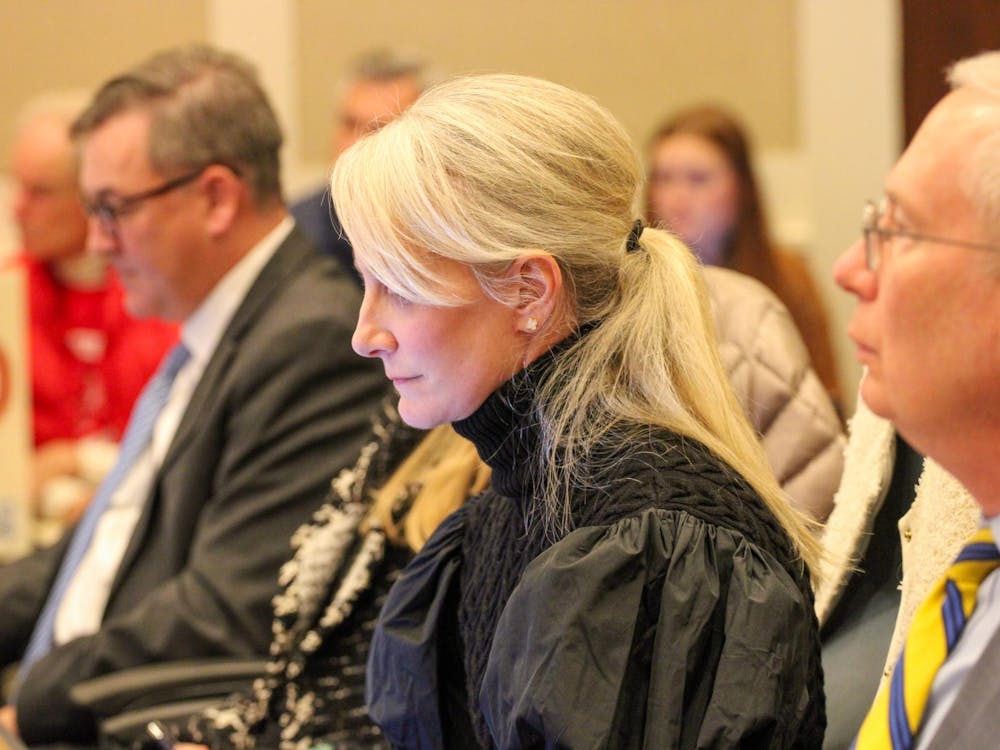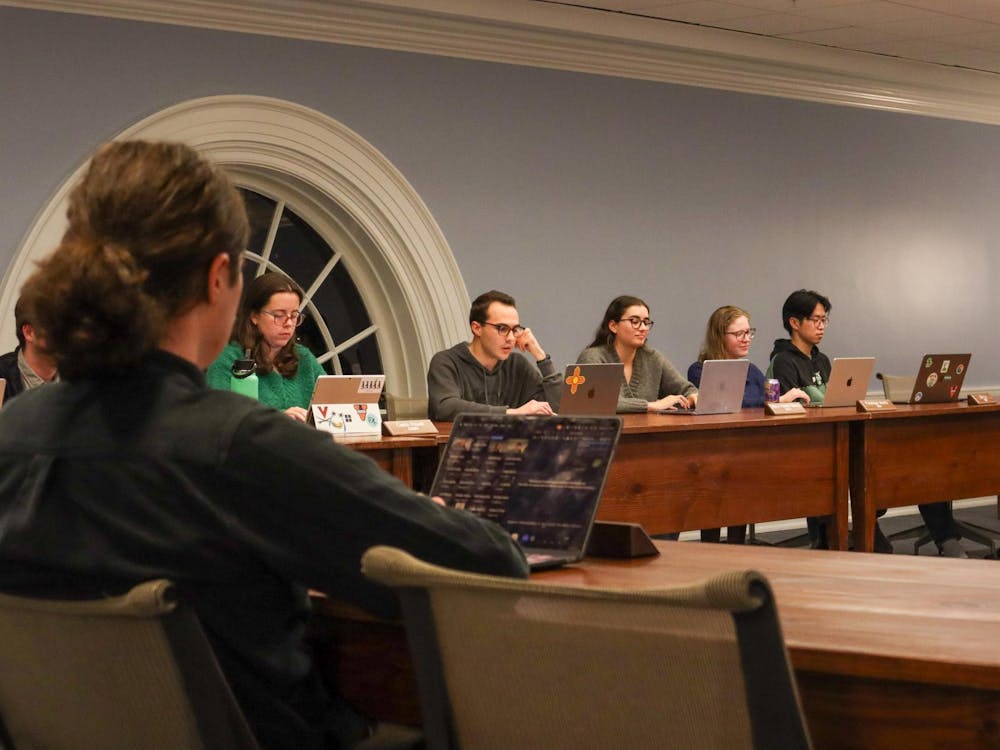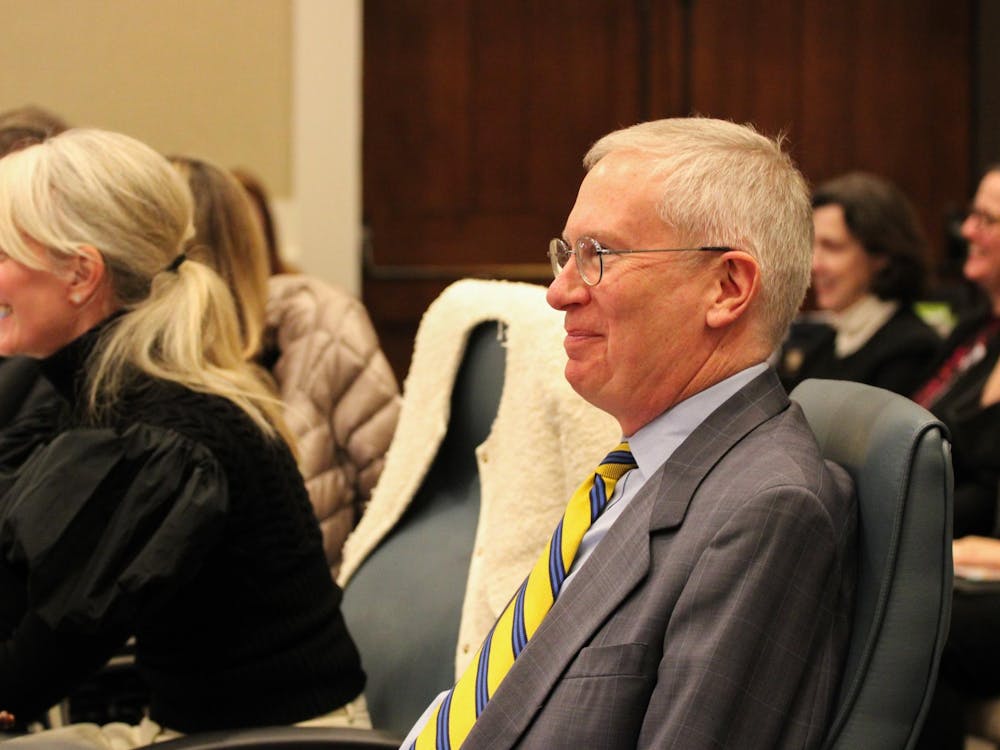Jefferson's study, complete with walls of books, piles of correspondences, and a computer with a 56K modem? The e-summit, a conference designed to engage faculty, alumni and students in discussing the importance of technology in today's society, attempted to portray this image.
The Friday morning session of the e-summit, entitled, "Jeffersonian Principles in the Internet Age," brought together leaders of companies prospering in the Internet age to discuss how success in the future can be achieved without sacrificing past principles.
The participants at the opening session were all graduates of the various schools at the University who now fill a wide variety of roles in providing the capital, information and innovation that fuels the Internet.
One of the most known participants on the panel was Timothy Koogle, the chairman and CEO of Yahoo!.
Other prominent figures on the panel included Halsey Minor, chairman, president and CEO of CNET, which is one of the leaders in information services, with over eight million users each month. Allison Abraham, chief operations officer of iVillage, represented her company, which concentrates on developing Web content that offers solutions to problems facing women.
The other panelists were less directly related to the Internet. For example, Lawton Fitt, managing director of Goldman Sachs, has focused her business in the past few years on initial public offerings for high-tech companies. Jeffrey Walker, managing partner of Chase Capital partners, also is involved in financing the Internet. His company provides venture capital for new e-commerce ventures. U. Bertram Ellis, chairman and CEO of iXL Holdings, helps businesses use technology more effectively. Rounding out the panel was Mark Templeton, presidents and director of Citrix Systems, a company that provides the software that
makes Internet technology run.
Koogle said the Internet is growing rapidly.
"This year, 1999, there are 200 million users world wide of the Web." Koogle said. "This is up from practically zero in 1995, and is expected to triple by the year 2003."
Koogle also emphasized the global nature of the Web.
"Almost one-half of those users are outside the U.S.," he said. He also said the number "is projected to grow to two-thirds by the year 2003".
Many of the panelists said their experiences at the University helped prepare them for jobs associated with the Web.
"I walk in every day and it's like being in a fire house, and that's quite frankly the way I felt at Darden everyday," Abraham said.
But the panelists said they feared other educational institutions might not be as skilled in coping with technological advances.
"I'm watching our own school system in Atlanta not change fast enough," Walker said.
He said he also is concerned about the role of technology in schools, particularly in the inner city.
He added that he believes the Internet and related technologies offer a "chance for helping the have-nots."
Minor discussed more traditional education improvements, combined with technology.
"We must better educate our students, with or without technology," he said.
The participants disagreed about methods to fund possible improvement in technology education.
Fitt said he believes the great wealth created by the Internet should be devoted to bettering the lives of others and furthering education.
The panelists also discussed another educational concern prompted by the Web - the number of college and MBA students leaving school to pursue technology-related careers.
Walker suggested that change is needed in "the way we do education" in order to stop the exodus.
One example of this trend is William Martin, one of the founders of Raging Bull, a stock-related site that is among the most visited on the Web. Martin left the Commerce school after completing his second year in order to pursue his business goals, and was a speaker during the Friday afternoon session of the conference.
Panelists also discussed the issue of using brand names on the Internet.
Abraham said creating brand names on the Web is just as important as in the real world market.
"Branding and a consistent experience for consumers will make companies successful," she said.
Koogle said he believes that Amazon.com's brand name is so strong due to its strategy of "establishing more persistent relationships with the consumer."
Panelists also focused on Internet privacy.
Halsey discussed potential security problems online. "Real Networks, once downloaded, knows who you are and every CD you download onto your PC," he added. "This information could potentially be used to help music companies market to users of this program."
Walker's concern about violation of privacy he said is prompted not by vendors of services, but by unauthorized users.
Ellis held the opinion that Jefferson would have been a champion of the Internet.
"He wouldn't have had to deal with all the drudgery of his work," he said.
Other e-summit sessions held Friday dealt with issues such as the "Internet, Media and Politics," "Legal and Regulatory Issues," and "Entrepreneurship and Wealth."
This weekend's e-summit is only one conference of the 2020 series program, which will bring together groups of recent alumni to consider where the University should be by the year 2020.






